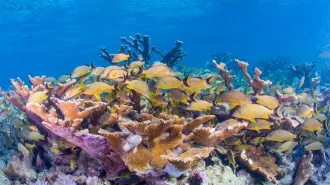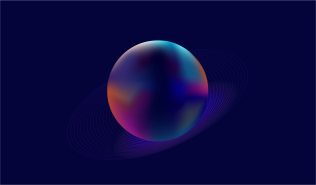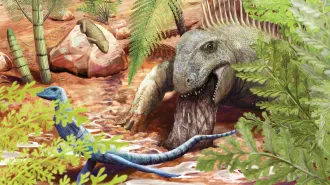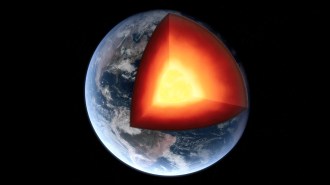News
-
 Ecosystems
EcosystemsFood chains in Caribbean coral reefs are getting shorter
Shorter food chains could mean reefs are less able to weather changes in food availability, threatening an already vulnerable ecosystem.
-
 Physics
PhysicsA precise proton measurement helps put a core theory of physics to the test
After years of confusion, a new study confirms the proton is tinier than once thought. That enables a test of the standard model of particle physics.
-
 Paleontology
PaleontologyFossilized vomit reveals 290-million-year-old predator’s diet
The regurgitated material from before the time of dinosaurs provides a rare window into the feeding habits of a prehistoric hunter.
By Jay Bennett -
 Health & Medicine
Health & MedicineAntibiotics can treat appendicitis for many patients, no surgery needed
After 10 years, just over half the people in a trial of antibiotics for appendicitis have not needed an appendectomy.
-
 Earth
EarthEarth’s core may hide dozens of oceans of hydrogen
Hydrogen reserves in Earth’s core large enough to supply at least nine oceans may influence processes on the surface today.
By Nikk Ogasa -
 Archaeology
ArchaeologyAI helps archaeologists solve a Roman gaming mystery
Researchers used AI-driven virtual players to test more than 100 rule sets, matching gameplay to wear patterns on a Roman limestone board.
By Tom Metcalfe -
 Health & Medicine
Health & MedicineDaily cups of caffeinated coffee or mugs of tea may lower dementia risk
A long-term observational study found a link between the amount of tea and caffeinated coffee people drank and the risk of dementia.
-
 Archaeology
ArchaeologyThe world’s oldest piece of clothing might be an Ice Age–era hide from Oregon
Two pieces of elk hide connected by a twisted-fiber cord are the earliest evidence of sewing. But what they were used for is still a mystery.
By Tom Metcalfe -
 Anthropology
AnthropologyWhen the fish stop biting, ice fishers follow the crowd
Study showcases how modern-day foragers stick together when seeking food. Such social forces could help explain the emergence of complex thinking.
By Sujata Gupta -
 Animals
AnimalsA bonobo’s imaginary tea party suggests apes can play pretend
Apes, like humans, are capable of pretend play, challenging long-held views about how animals think, a new study suggests.
By RJ Mackenzie -
 Neuroscience
NeuroscienceBabies brains’ can follow a beat as soon as they’re born
Brain scans and signals show babies can sort images and sense rhythm, offering new insight into how infant brains are wired from the start.
-
 Health & Medicine
Health & MedicineThe best way to help Alzheimer’s patients may be to help their caregivers
A mathematical model simulated patient outcomes when given caregiver support or an expensive Alzheimer’s drug to determine cost and health benefits.